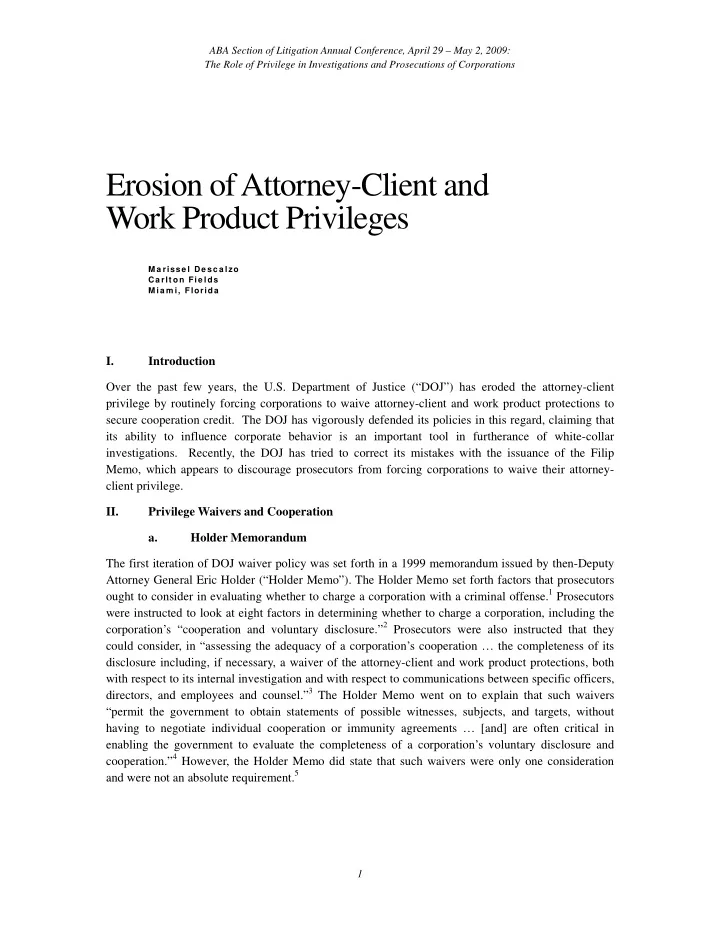

ABA Section of Litigation Annual Conference, April 29 – May 2, 2009: The Role of Privilege in Investigations and Prosecutions of Corporations Erosion of Attorney-Client and Work Product Privileges M a risse l De sc a lzo Ca rlt on Fie lds M ia m i, Florida I. Introduction Over the past few years, the U.S. Department of Justice (“DOJ”) has eroded the attorney-client privilege by routinely forcing corporations to waive attorney-client and work product protections to secure cooperation credit. The DOJ has vigorously defended its policies in this regard, claiming that its ability to influence corporate behavior is an important tool in furtherance of white-collar investigations. Recently, the DOJ has tried to correct its mistakes with the issuance of the Filip Memo, which appears to discourage prosecutors from forcing corporations to waive their attorney- client privilege. II. Privilege Waivers and Cooperation a. Holder Memorandum The first iteration of DOJ waiver policy was set forth in a 1999 memorandum issued by then-Deputy Attorney General Eric Holder (“Holder Memo”). The Holder Memo set forth factors that prosecutors ought to consider in evaluating whether to charge a corporation with a criminal offense. 1 Prosecutors were instructed to look at eight factors in determining whether to charge a corporation, including the corporation’s “cooperation and voluntary disclosure.” 2 Prosecutors were also instructed that they could consider, in “assessing the adequacy of a corporation’s cooperation … the completeness of its disclosure including, if necessary, a waiver of the attorney-client and work product protections, both with respect to its internal investigation and with respect to communications between specific officers, directors, and employees and counsel.” 3 The Holder Memo went on to explain that such waivers “permit the government to obtain statements of possible witnesses, subjects, and targets, without having to negotiate individual cooperation or immunity agreements … [and] are often critical in enabling the government to evaluate the completeness of a corporation’s voluntary disclosure and cooperation.” 4 However, the Holder Memo did state that such waivers were only one consideration and were not an absolute requirement. 5 1
ABA Section of Litigation Annual Conference, April 29 – May 2, 2009: The Role of Privilege in Investigations and Prosecutions of Corporations b. Thompson Memorandum The Holder Memo was updated in 2003 by then Deputy Attorney General Larry Thompson (“Thompson Memo”). The Thompson Memo required prosecutors to consider nine factors in deciding whether to charge a corporation, including the corporation’s willingness to cooperate. 6 Specifically, the Thompson Memo state’s that a “corporation’s timely and voluntary disclosure of wrongdoing and its willingness to cooperate in the investigation are relevant factors in determining whether to charge the corporation.” 7 The Thompson Memo further states that “[i]n gauging the extent of the corporation’s cooperation, the prosecutor may consider the corporation’s willingness to identify the culprits within the corporation, including senior executives; to make witnesses available; to disclose the complete results of its internal investigation; and to waive attorney-client and work product protection.” 8 In essence, the Thompson Memo expanded and made mandatory the factors in the Holder Memo. As a result, it suffered from withering criticism from a range of organizations and individuals in the legal community, including the American Bar Association, the U.S. Chamber of Commerce, the American Civil Liberties Union, former senior DOJ officials and U.S. Attorneys, academics and practitioners. 9 c. McNulty Memorandum The harsh criticism of the Thompson Memo and industry pressure forced the DOJ to adopt a revised policy, which was reflected in a memorandum authored by then Deputy Attorney General Paul McNulty in 2006 (“McNulty Memo”). 10 The McNulty memorandum is regarded by some as a small step in the right direction away from the Thompson memorandum and toward preserving the attorney client and work product protections. Others believe the McNulty memorandum further confuses the issue of privilege waivers and employee rights, because it also instructs prosecutors to take into account “whether the corporation appears to be protecting its culpable employees and agents.” 11 The McNulty Memo sets forth the following nine factors that prosecutors should consider when deciding whether to charge a corporation with a criminal violation: “1) the nature and seriousness of the offense, including the risk of harm to the public, and applicable policies and priorities, if any, governing the prosecution of corporations for particular categories of crime; (2) the pervasiveness of wrongdoing within the corporation, including the complicity in, or condonation of, the wrongdoing by corporate management; (3) the corporation’s history of similar conduct, including prior criminal, civil, and regulatory enforcement actions against it; (4) the corporation’s timely and voluntary disclosure of wrongdoing and its willingness to cooperate in the investigation of its agents; (5) the existence and adequacy of the corporation’s pre-existing compliance program; (6) the corporation’s remedial actions, including any efforts to implement an effective corporate compliance program or to improve an existing one, to replace responsible management, to discipline or terminate wrongdoers, to pay restitution, and to cooperate with the relevant government agencies; (7) collateral consequences, including disproportionate harm to shareholders, pension holders and employees not proven personally culpable and impact on the public arising from the prosecution; (8) the adequacy of the prosecution of individuals responsible for the corporation’s malfeasance; and (9) the adequacy of remedies such as civil or regulatory enforcement actions.” 12 The McNulty memorandum emphasizes cooperation between “responsible corporate leaders” and the Department of Justice and the need for prosecutors to maintain “professionalism and civility” in order 2
Recommend
More recommend